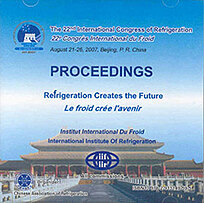
IIR document
Cycle characteristics of a solid adsorption cooling tube driven by waste heat.
Author(s) : WU W. D., ZHANG H., WANG J. F.
Summary
The theoretical thermodynamic cycle of a single solid adsorption refrigeration tube driven by waste heat is different from the traditional adsorption refrigeration cycle due to its features in configuration, which is composed of the following four processes: pressure-rising desorption, pressure-falling desorption, pressure-falling adsorption and pressure-rising adsorption. The detailed working processes and principles for the cooling tube were described and discussed. The effects of the external ambient parameters such as the heat source temperature, ambient air temperature, air velocity, etc. on performance of the refrigeration cycle were also discussed based on experimental data and the corresponding Clapeyron diagrams (lnp-1/T). The results show that within a certain range the increase of the heat source temperature makes for the decrease of the minimum cooling temperature and the increase of specific cooling power (SCP) of the cooling tube, and COP is up to the optimum nearly at 275°C of the heat source temperature. The increase of the ambient air temperature or air velocity results in a certain increase of the minimum cooling temperature and SCP, respectively. And COP varies little with the variation of ambient air temperature, however decreases little with the increase of air velocity.
Available documents
Format PDF
Pages: ICR07-B1-1315
Available
Public price
20 €
Member price*
Free
* Best rate depending on membership category (see the detailed benefits of individual and corporate memberships).
Details
- Original title: Cycle characteristics of a solid adsorption cooling tube driven by waste heat.
- Record ID : 2007-2608
- Languages: English
- Source: ICR 2007. Refrigeration Creates the Future. Proceedings of the 22nd IIR International Congress of Refrigeration.
- Publication date: 2007/08/21
Links
See other articles from the proceedings (839)
See the conference proceedings
Indexing
-
Themes:
Heat transfer;
Absorption and adsorption systems - Keywords: Heat pipe; Calculation; Tube; Heat recovery; Zeolite; Adsorption system; Performance; Thermodynamic cycle; COP
-
Dynamic Modelling and Design Optimization of a ...
- Author(s) : YANG Z., QU M., GLUESENKAMP K.
- Date : 2021/08/31
- Languages : English
- Source: 13th IEA Heat Pump Conference 2021: Heat Pumps – Mission for the Green World. Conference proceedings [full papers]
- Formats : PDF
View record
-
Towards tailored materials for adsorption heat ...
- Author(s) : LANZERATH F., KLITZING B., BARDOW A.
- Date : 2011/04/06
- Languages : English
- Source: Sources/sinks Alternative to the Outside Air for Heat Pump and Air-conditioning Techniques (Alternative Sources - AS), Padua, Italy, April 5-7, 2011. / International Sorption Heat Pump Conference (ISHPC11), Padua, Italy, April 6-8, 2011.
- Formats : PDF
View record
-
Enhanced heat transfer in solid sorption systems.
- Author(s) : BABENKO V., KANONCHIK L., VASILIEV L.
- Date : 1997/09/15
- Languages : English
- Source: 3rd International Seminar on heat pipes, heat pumps, refrigerators. Proceedings.
View record
-
Second law analysis of a novel cycle concept fo...
- Author(s) : SCHWAMBERGER V., JOSHI C., SCHMIDT F. P.
- Date : 2011/04/06
- Languages : English
- Source: Sources/sinks Alternative to the Outside Air for Heat Pump and Air-conditioning Techniques (Alternative Sources - AS), Padua, Italy, April 5-7, 2011. / International Sorption Heat Pump Conference (ISHPC11), Padua, Italy, April 6-8, 2011.
- Formats : PDF
View record
-
Sorption machines with thermal control provided...
- Author(s) : VASILIEV L. L.
- Date : 2002/09/24
- Languages : English
- Source: Proceedings of the International Sorption Heat Pump Conference.
View record
